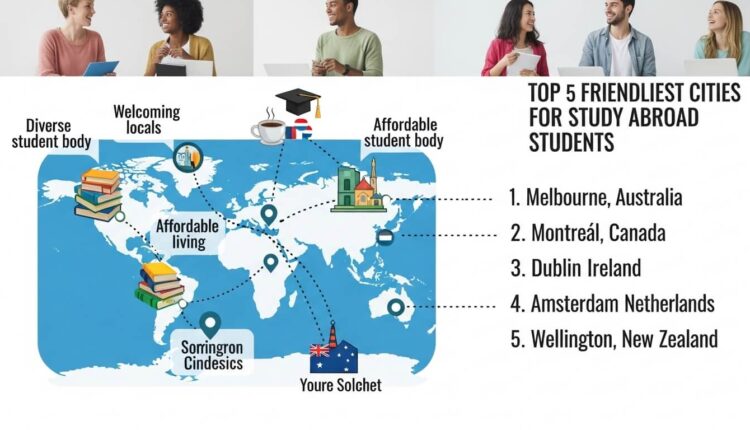The Top 5 Friendliest Cities for Study Abroad Students
Friendliest Cities for Study Abroad Students:- Not every study abroad city feels like home — and choosing the wrong one could leave you feeling isolated, stressed, and even doubting your decision to move abroad in the first place. While thousands of students are already living their dream overseas, too many find themselves struggling to make friends, fit in, or feel truly welcome.
A global survey by the QS Best Student Cities 2025 report found that 76% of international students said a city’s friendliness was one of the top three factors influencing whether they would recommend that city to others — or leave early. It’s not just about the quality of education or the ranking of your university; it’s about the everyday experience of living there. Do you think people will smile at you in the grocery store? Will neighbors invite you to join local celebrations? Will you have a network of people to lean on when homesickness hits?
These questions might seem small compared to tuition fees and visa applications, but they’re not. Your mental health, social life, and overall happiness abroad depend on feeling connected to your environment. A cold, unwelcoming city can quickly turn your once-exciting adventure into a draining, lonely routine.
That’s why we’ve created this guide — to save you from learning this the hard way. We’ve researched and compiled a list of the Top 5 Friendliest Cities for Study Abroad Students, based on student satisfaction surveys, global rankings, and first-hand reviews. Whether you’re looking for a buzzing metropolis full of international students or a cozy small city where everyone knows your name, you’ll find a place here that matches your personality and expectations.
By the end of this article, you’ll have a clear picture of where you’re most likely to thrive, make friends, and feel at home while you pursue your education.
Why Friendliness Matters
When most students choose a study abroad destination, they focus on tuition fees, rankings, or post-graduation work opportunities — and while those are important, they’re not the full story. The human experience of living abroad can make or break your study adventure.
A city’s friendliness goes beyond smiles and greetings. It shapes your mental health, your social life, and your academic performance. In fact, the Global Education Insights Report 2024 revealed that cities with a higher “friendliness index” saw a 20–25% rise in international student enrollment over five years. Students are actively seeking destinations where they’ll feel welcome, safe, and supported.
The Impact on Mental Health
Feeling like you belong reduces homesickness, anxiety, and stress — three common emotional hurdles faced by international students. A welcoming environment means you’re more likely to talk to classmates, ask for help, and participate in local life. These small daily interactions are powerful in fighting isolation.
Better Social and Academic Outcomes
When you live in a city that encourages connection, you naturally build a support network faster. This network is not just for parties and socializing — it becomes a safety net when you face challenges like adjusting to a new education system, finding accommodation, or landing internships. Students who feel welcomed are also more engaged in class, leading to better academic outcomes.
Real-Life Scenarios
Imagine this: you arrive in your new city, tired from the long flight, and your neighbor offers you tea and tells you about the best local market for groceries. Your professor takes time to learn your name and introduces you to other international students in the class. A stranger smiles and gives you directions when you get lost on your way to campus.
Now picture the opposite: you step into your new apartment building, and no one acknowledges you. Your professor barely notices you in a class of hundreds, and you spend weeks eating alone because you don’t know where to meet people. The excitement of studying abroad quickly turns into a cycle of loneliness.
Clearly, friendliness isn’t just a “nice-to-have” — it’s essential for thriving abroad. Choosing a city with a strong culture of inclusion and community can mean the difference between just surviving and truly enjoying your study abroad journey.
The Top 5 Friendliest Cities (Main List)
These five cities stand out in global rankings and student feedback for being warm, welcoming, and supportive — not just in infrastructure, but in the human side of everyday life.
1. London, United Kingdom
✅ QS Best Student Cities 2025 Rank: #1
✅ Student Voice / Satisfaction: London scores consistently high in “Student View” and “Student Mix” metrics
Key Student Perks:
- Enormous cultural diversity — plenty of communities, student associations, and international groups to plug into.
- Strong public transportation, making it easy to get around and explore neighborhoods.
- Access to support services (student counselling, international student offices) in most universities.
Cost of Living Insight:
Rent and living costs in London are high. Even though London tops many charts for desirability, its affordability scores lag behind. Because of that, many students opt for shared housing farther from the city center or find creative cost-saving strategies (e.g. cooking, public transport passes).
Mini Student Review / Quote:
“I expected London to be overwhelming — but I found a network within weeks. I joined a local music society and quickly made friends from all continents.”
2. Tokyo, Japan
✅ QS Best Student Cities 2025 Rank: #2
✅ Also scores highly in “Employer Activity” and “Desirability” categories
Key Student Perks:
- Exceptional safety and cleanliness — many students praise how comfortable it is to walk alone even late at night.
- Integrated public transport network (metros, buses) with multilingual signage.
- Local hospitality culture (omotenashi) means people often go out of their way to be helpful.
Cost of Living Insight:
Tokyo is not cheap — rent, food, and public transport can add up. But compared to some major Western cities, there are efficient systems and student discounts that help.
Mini Student Review / Quote:
“I once got lost in Shibuya; a group of locals asked me where I was going and walked me halfway there — that wouldn’t happen many places.”
3. Seoul, South Korea
✅ QS Best Student Cities 2026 Rank: #1 (overtook London)
✅ Strong marks in “Employer Activity,” “Desirability,” and “Student Mix”
Key Student Perks:
- Thriving technology, innovation, and startup culture gives students chances to intern or network.
- Blend of tradition and modern life helps newcomers get cultural exposure and connection.
- Many university campuses in Seoul have “buddy programs” or mentoring systems for international students.
Cost of Living Insight:
While Seoul is more affordable than London, costs are rising. Students often live in shared flats or campus dorms to reduce expenses.
Mini Student Review / Quote:
“What surprised me was how local students would invite me to their family BBQs or weekends — I never felt like I was just ‘visiting.’”
4. Munich, Germany
✅ QS Best Student Cities 2025 Rank: #4
✅ Germany often scores high in “Desirability” (quality of life, infrastructure)
Key Student Perks:
- Excellent public transport, clean infrastructure, and safety.
- Cultural openness: many English-language programs, and Germany’s central location in Europe lets you travel easily.
- Generous student benefits in Bavaria (discounts, cultural passes, free museum days).
Cost of Living Insight:
Munich is among the more expensive German cities, especially for rent. But compared with some global capitals, it’s still reasonable. Also, tuition is comparatively lower (or free, for some programs) in Germany.
Mini Student Review / Quote:
“I joined the local hiking club and got to know a dozen German students in the first month. They were curious about my culture and eager to include me.”
5. Melbourne, Australia
✅ QS Best Student Cities 2025 Rank: #5
✅ Often ranks top for “Student Mix” (diversity)
Key Student Perks:
- Vibrant arts, music, and café culture that lends itself to social spontaneity.
- Many events, festivals, and free community programs that invite participation.
- Friendly local culture: people often chat with strangers in public spaces.
Cost of Living Insight:
Not cheap — Melbourne’s living expenses are high, especially rent and utilities. Yet student discounts, transport concessions, and part-time job opportunities help offset costs.
Mini Student Review / Quote:
“Melbourne felt friendly from day one — while catching the tram, someone offered to help with my bags, asked where I was from, and I ended up with a new friend in 10 minutes.”
These five cities combine robust infrastructure, safety, student services, and abundant social opportunities — making them stand out in the world of study abroad.
Expert Tips for Thriving in a New City
Finding yourself in one of the world’s friendliest cities is a huge head start — but thriving abroad takes effort. Even the most welcoming places can feel intimidating at first, especially if you’re shy, dealing with language barriers, or simply overwhelmed by all the changes. These expert tips will help you build meaningful connections faster and feel truly at home.
1. Join Local Clubs, Student Societies, and Meetups
Universities and colleges almost always have dozens of student clubs — cultural associations, sports teams, debate societies, volunteering groups, and more. The earlier you join, the faster you’ll build a network. Don’t wait for friends to find you; put yourself where friendships naturally form.
Pro Tip: Look beyond just university events — many cities host language exchanges, hobby meetups, and free weekend markets where you can meet locals.
2. Learn Key Phrases in the Local Language
Even if your courses are taught in English, showing effort to learn basic greetings in the local language goes a long way. Locals appreciate when you try to communicate, and it often opens doors to deeper conversations.
Example: In Tokyo, learning to say “Arigato gozaimasu” (thank you very much) or “Sumimasen” (excuse me) can instantly warm up interactions.
3. Volunteer and Give Back
Volunteering not only helps you meet like-minded people, but it also gives you purpose and connects you to the local community. Many international students report that volunteering helped them feel less like “outsiders” and more like contributors.
Ideas: Help at local food banks, cultural festivals, language tutoring programs, or environmental clean-up events.
4. Be Proactive in Social Situations
Don’t wait for invitations — make the first move. Invite classmates for coffee after lectures, organize a study group, or suggest a weekend outing. Most students are looking to make friends too; they might just be waiting for someone else to take the lead.
5. Use Online Tools to Connect
Apps like Meetup, Bumble BFF, and Couchsurfing Hangouts can help you find events and meet people nearby. Many cities also have Facebook or WhatsApp groups for international students where you can share tips, ask questions, and find roommates.
“Have you studied in one of these cities? How did you make friends and settle in? Share your experience in the comments — your story might inspire another student to find their perfect destination.”
This step not only adds interactivity to your content (a signal Google loves) but also helps you build a community around your blog or platform.
Conclusion – Friendliest Cities for Study Abroad Students
Studying abroad is one of the most exciting decisions you’ll ever make — but it’s also one of the most personal. The city you choose will shape not just your education but your daily happiness, social connections, and long-term memories.
By now, you’ve seen how friendliness is far from just a “nice extra.” It affects your mental health, your academic performance, and your ability to build a home away from home. Cities like London, Tokyo, Seoul, Munich, and Melbourne prove that the right location can give you both a world-class education and a welcoming community.
Your study abroad experience isn’t just about attending lectures or ticking off landmarks — it’s about belonging. Choosing a city that welcomes you with open arms means you’ll come back not just with a degree, but with lifelong friends and a sense of growth you can’t put a price on.
Take the Next Step
If you found this guide helpful, here’s how you can go deeper:
🔗 Related Guides to Explore
- 7 Steps to Get Your Study-Abroad Visa Approved the First Time – Avoid common visa mistakes and sail through your application process.
- Cheapest Countries for International Students in 2025 – Discover destinations that are budget-friendly without compromising quality.
📥 Free Resource:
Download Our Study-Abroad City Comparison Checklist – Compare costs of living, student friendliness scores, and visa requirements side by side. This free, ready-to-use PDF will save you hours of research.
Final Thought
Whether you’re looking for a buzzing global city or a cozy student-friendly hub, remember this: you deserve to feel safe, supported, and included during your time abroad. Start your journey with the right city, and you’re already halfway to a life-changing experience.


